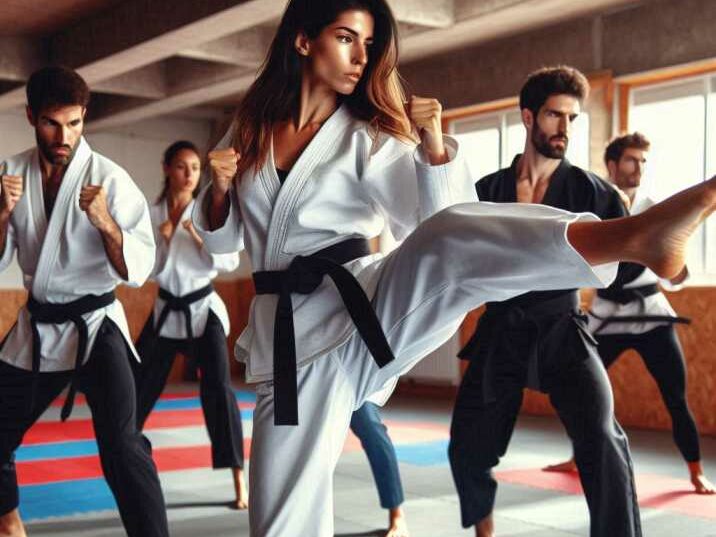Introduction:
Table of Contents
Emotions are an integral part of human life, influencing our thoughts, behaviors, and overall well-being. However, managing these emotions effectively can be challenging, especially during stressful or overwhelming situations. Emotional regulation refers to the ability to understand, manage, and express one’s emotions in a healthy and constructive manner. While there are various techniques and practices for enhancing emotional regulation, one particularly effective method is martial arts. In this article, we’ll explore how practicing martial arts can assist in managing feelings and promoting emotional well-being.

1. Understanding Emotional Regulation:
Emotional regulation involves the process of recognizing and managing one’s emotions, including anger, sadness, fear, and joy. It allows individuals to respond to situations calmly and adaptively, rather than reacting impulsively or becoming overwhelmed by their emotions. Research indicates that effective emotional regulation is associated with numerous benefits, including better mental health, enhanced relationships, and improved overall quality of life.
Benefits of Emotional Regulation:
Reduced Stress:
Emotional regulation serves as a buffer against stress by allowing individuals to navigate challenging situations with composure and clarity. When faced with stressors, such as deadlines, conflicts, or uncertainties, those proficient in emotional regulation can maintain a sense of equilibrium and perspective. By regulating their emotional responses, they mitigate the physiological and psychological effects of stress, promoting a state of calmness and relaxation. This, in turn, contributes to overall well-being and resilience in the face of adversity.
Enhanced Self-Control:
Self-control is fundamental to effective decision-making and behavior management. Through emotional regulation, individuals cultivate the ability to pause, reflect, and respond thoughtfully rather than react impulsively to stimuli. By harnessing their emotions rather than being controlled by them, they exercise greater agency over their actions and choices. This heightened self-control extends beyond immediate impulses to encompass long-term goals and aspirations, empowering individuals to make informed and deliberate decisions aligned with their values and objectives.
Improved Relationships:
Effective emotional regulation lays the foundation for meaningful and harmonious relationships. By understanding and managing their own emotions, individuals can engage with others in a more empathetic, compassionate, and respectful manner. This fosters healthier communication patterns characterized by active listening, empathy, and conflict resolution skills. As a result, interpersonal connections deepen, trust flourishes, and conflicts are navigated constructively, leading to more fulfilling and satisfying relationships in both personal and professional spheres.
Increased Resilience:
Resilience is the capacity to adapt and bounce back from adversity, setbacks, and challenges. Emotional regulation plays a pivotal role in enhancing resilience by equipping individuals with coping mechanisms and strategies to navigate difficult circumstances. Those adept at regulating their emotions are better able to maintain a sense of optimism, agency, and purpose in the face of adversity. Rather than being overwhelmed by setbacks, they view challenges as opportunities for growth, learning, and self-improvement. This resilient mindset enables them to persevere through hardships, emerge stronger, and thrive in the face of life’s inevitable ups and downs.
2. Martial Arts: A Path to Emotional Mastery:
Martial arts encompass a diverse range of combat practices and traditions originating from various cultures around the world. Beyond physical techniques and self-defense skills, martial arts emphasize mental discipline, emotional control, and spiritual development. The practice of martial arts involves a combination of physical training, mental focus, and emotional awareness, making it an ideal avenue for enhancing emotional regulation.
Core Principles of Martial Arts:
Discipline:
Discipline lies at the heart of martial arts practice, shaping the character and behavior of practitioners. Through structured training routines and adherence to codes of conduct, martial artists cultivate discipline in both their physical actions and mental attitudes. This discipline is instilled through repetitive practice, where practitioners learn to commit themselves wholeheartedly to their training regimen, regardless of challenges or obstacles. By adhering to the principles of discipline, martial artists develop consistency, perseverance, and resilience, which are essential qualities not only in the dojo but also in all aspects of life.
Focus:
Focus is essential for mastering the intricate techniques and movements of martial arts. Practitioners learn to concentrate their attention and channel their energy towards specific goals and objectives, whether it’s executing a precise kick, blocking an opponent’s strike, or maintaining balance and poise. Through focused practice, martial artists develop heightened awareness of their surroundings and opponents, enabling them to anticipate and respond effectively to dynamic situations. This mental acuity and concentration extend beyond the dojo, empowering practitioners to remain centered and focused amidst distractions and challenges in everyday life.
Mindfulness:
Mindfulness lies at the intersection of body and mind in martial arts practice. By encouraging practitioners to be fully present in the moment and attuned to their thoughts and feelings, martial arts promote a state of mindfulness that transcends the physical realm. Whether performing katas, sparring with an opponent, or engaging in meditation, practitioners cultivate a deep sense of awareness and inner peace. This mindfulness fosters a profound connection between mind, body, and spirit, facilitating self-discovery, self-expression, and personal growth. Through mindfulness practice, martial artists develop resilience, emotional regulation, and a deeper understanding of themselves and the world around them.
Self-Reflection:
Self-reflection is a cornerstone of martial arts philosophy, providing practitioners with opportunities for introspection and personal growth. Engaging in martial arts encourages individuals to look inward, examine their strengths and weaknesses, and confront their fears and limitations. Through self-reflection, martial artists gain insights into their motivations, beliefs, and values, enabling them to align their actions with their higher purpose and aspirations. This process of self-discovery fosters self-awareness, authenticity, and integrity, empowering practitioners to cultivate a deeper sense of meaning and fulfillment in their martial arts journey and beyond.
3. Techniques for Emotional Regulation in Martial Arts:
Martial arts training provides individuals with practical tools and techniques for managing their emotions effectively. By integrating these practices into their daily routine, practitioners can develop greater emotional resilience and control.
Breathing Exercises:
Controlled breathing techniques, such as deep diaphragmatic breathing and meditative breathing, help calm the mind and regulate emotional responses during stressful situations.
Mindfulness Practice:
Through mindful awareness of body movements and sensations, martial artists learn to observe their emotions without judgment, allowing for greater emotional clarity and self-regulation.
Visualization and Relaxation Techniques:
Visualization exercises and guided imagery techniques enable practitioners to envision themselves responding calmly and confidently to challenging situations, reducing anxiety and tension.
Conflict Resolution Skills:
Martial arts teach effective conflict resolution strategies, emphasizing the importance of diplomacy, negotiation, and empathy in resolving disputes peacefully.
4. Incorporating Martial Arts into Your Routine:
Whether you’re a seasoned martial artist or a beginner exploring this ancient discipline, integrating martial arts into your daily routine can offer numerous benefits for emotional regulation and overall well-being.
Finding the Right Style:
Explore different martial arts styles, such as karate, taekwondo, kung fu, or jiu-jitsu, to discover which aligns best with your interests and goals.
Joining a Dojo or Martial Arts School:
Enroll in a reputable martial arts dojo or school with experienced instructors who can provide guidance, support, and structured training programs.
Practicing Consistently:
Commit to regular practice sessions to develop proficiency in martial arts techniques and cultivate emotional resilience over time.
Embracing the Journey:
Approach martial arts training as a journey of self-discovery and personal growth, embracing both the challenges and rewards along the way.

Table of Information:
| Heading | Details |
|---|---|
| Understanding Emotional Regulation | Benefits, importance, and components |
| Martial Arts: A Path to Mastery | Principles, disciplines, and mindfulness |
| Techniques for Emotional Regulation | Breathing exercises, mindfulness, visualization |
| Incorporating Martial Arts | Finding the right style, joining a dojo, practicing consistently |
Conclusion:
In conclusion, martial arts offer a holistic approach to emotional regulation, combining physical fitness, mental discipline, and emotional awareness. By incorporating martial arts practice into your routine, you can develop invaluable skills for managing feelings effectively, reducing stress, and enhancing overall well-being. Whether you’re seeking inner peace, self-confidence, or a sense of empowerment, martial arts provide a pathway to emotional mastery and personal growth.
FAQs:
1. How can martial arts help with emotional regulation?
Martial arts promote discipline, focus, mindfulness, and self-reflection, which are essential for managing emotions effectively.
2. Is martial arts suitable for everyone, regardless of age or fitness level?
Yes, martial arts can be adapted to suit individuals of all ages and fitness levels, with various styles and techniques available to accommodate diverse needs and abilities.
3. Can practicing martial arts improve mental health?
Yes, regular martial arts practice has been shown to enhance mental health by reducing stress, improving mood, and increasing self-confidence.
4. How often should I practice martial arts to experience benefits for emotional regulation?
Consistent practice is key to reaping the rewards of martial arts for emotional regulation. Aim for regular sessions, whether it’s several times a week or a few times a month, to see meaningful progress.
5. Are there any precautions I should take before starting martial arts training?
Before beginning martial arts training, consult with a healthcare professional, especially if you have any underlying medical conditions or injuries. Additionally, choose a reputable dojo or instructor to ensure safe and effective instruction.
6. How can martial arts benefit mental health?
Martial arts offer numerous benefits for mental health by providing a holistic approach to well-being. Through physical activity, practitioners release endorphins, neurotransmitters that promote feelings of happiness and reduce stress. Additionally, the discipline and focus required in martial arts training can help individuals develop resilience, concentration, and emotional regulation skills, which are essential for managing mental health challenges such as anxiety and depression.


